UK Equity Release Summit: Panel on addressing responsibilities towards ageing consumers

The importance of understanding ageing customers and their needs was the focus of a plenary session held at the UK’s Equity Release Summit held on 16 May 2023.
The session explored the vulnerabilities of the sector’s consumers, addressed the industry’s responsibilities in supporting these consumers in later life, and stressed upon the innovation required to ensure the continued stewardship of consumer safeguards. The panel was led by consumer champion and commentator, James Daley, founder and MD of Fairer Finance; and counted stellar speakers such as Mike Ellicock, Co-Founder & Chief Executive, Plain Numbers; Richard Lane, Director of External Affairs & Operating Subsidiaries, StepChange; Chris Pond, Chair, Financial Inclusion Commission and Lyndsey Fallon, Partner, Deloitte.
Jim Boyd, CEO of the Equity Release Council, launched the panel discussion by requesting Jeff Prestridge, Group Wealth & Personal Finance Editor of Daily Mail and General Trust (DMGT), to deliver the keynote address. A consumer campaigner and a newspaper finance journalist for over 25 years, Jeff has been a major commentator in helping consumers make more informed decisions.
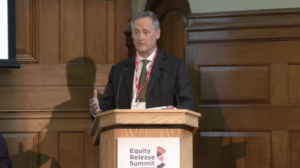
Jeff Prestridge started by emphasising that the 350 delegates present reflected the importance of the Equity Release Council (ERC), with the equity release market sure to grow as elderly people continued to use their homes to release much needed liquidity.
“Times are going to remain tough for quite a while and equity release will provide a financial solution. At the ERC, your key role in raising standards means we now have an equity release market which is fit for purpose. Yet, there is no room for complacency. It is vital that the consumer comes first and is at the heart of everything you do – yes, the FCA is imposing consumer duties on you – but serving the best needs of consumers should be built into your DNA,” he highlighted.
He noted that the equity release industry at inception had promoted certain schemes, involving the use of customer bonds, that were nothing short of calamitous, with customers hit by a double whammy of falling stock markets and a stiff housing market correction. He noted that he would use his keynote address to steer the discussion away from this dark and dim past, by reflecting on what the industry should do to be fit for the future.
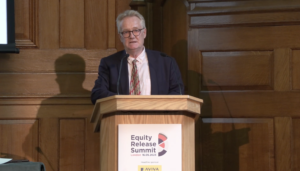
“The industry must remain fully focused on providing customers with transparent, value for money products underpinned by no negative equity guarantees. It must also be committed to providing stellar service, not just in the run up to the plan being purchased but during the plan’s life,” he noted. He also emphasised that equity release is not for everyone and that there are better alternatives such as retirement interest only mortgages or releasing equity through downsizing, pointing out that every sale must be underpinned by what is good for the customer, not the provider or advisor.
He noted the industry’s willingness to keep evolving and adapting, in the process making the plans far more flexible such as, the ability of plan holders to counter the impact of compound interest on their mortgages. “In 2022, equity release customers made nearly 190,000 penalty free payments, 50% up on the year before, saving nearly £ 160 mn in future interest costs. That is great for consumers and for the reputation of the equity release market. It is a double win!”
He lauded the council for wiring into its standards a requirement for all new plans to provide penalty-free, partial repayment options; extending the ability to borrow amounts under equity release plans on a piecemeal basis; building inheritance protection into plans; and the emergence of a re-mortgage market enabling borrowers to switch to cheaper plans.
“We now have more than 1,500 advisers and the industry is attracting new players, whether new advisers or funders. The more providers in the market, the more competition it will spark, and the more innovation it will lead to, in the process driving down charges,” he commented.
He noted the great progress that the industry has made in recent years with the ERC having recently put in place measures such as recommending all providers show charges and set out key information in a way that buyers can understand easily; any plan sold to show how the loan will grow over time; no plan to be sold without everyone concerned showing that they understand the impact of compound interest on the loan; and an imminent announcement that family will be given key information at key points in their equity release journey, for example, when the loved one dies or when the plan ceases.
He urged that the industry should be better at pointing out the practical uses of equity release, be it to make home improvements, to adapt homes to specific care needs or to fund at-home care, driving home three key points in conclusion:
- The industry needs to do more to educate the public with a more consumer-friendly Council website;
- As scamming is on the rise, the industry must do more to ensure consumers do not fall foul of scammers; and,
- With lending for the first quarter this year at its lowest level since the pandemic, people clearly still feel cautious about buying into a fixed rate product, hence the Council must analyse the impact of higher interest rates on the market.
Next, James Daley took over on the note that good progress had been made in just the last 3 years since he addressed the audience, and that the latest regulation on consumer duty boded well for the future.
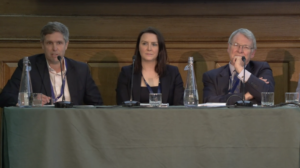
“Consumer duty comes into force in just 11 weeks. It provides an obligation on all financial services firms not just to work towards delivering good customer outcomes but to prove that they’re doing so and to attest so at board level every year.” He summarised that it meant proving that you’re offering fair value, that you’re providing the right level of support to customers, that you have robust product governance in place and that you’re communicating with customers in a language they can understand.
He highlighted that there needs to be a clear basis for justifying product pricing, rates being what they are, and also emphasised that communications is an area where all companies, not just equity release companies, have a lot of work to do. The consumer duty now expects it of the players to simplify the technical jargon, he added.
He concluded on the note that the good news is that if the industry can meet the requirements, their interests will be much more aligned with the interests of consumers, soberingly cautioning players that ‘it takes years to build a reputation for trust and integrity and seconds to shatter it.’
James next introduced the members of the panel, first up being Mike Ellicock, co-founder and CEO of Plain Numbers, who started his career in the military, did an MBA, and ended up running a mass education business. He then founded a charity to improve numeracy across the UK which led to the creation of Plain Numbers in 2020.
Mike took to the stage to address how the industry can communicate better. He cautioned that half of adults understand as much as primary schoolchildren. He further highlighted that the issue is not just about numbers but also about attitudes – about how numbers make people feel.
“The first thing is about numbers themselves. There is plenty of evidence about how to communicate around numbers so that more people can understand. Secondly, put numbers in context – avoid three letter abbreviations and try to overcome the curse of knowledge. The third element is about behavioural science – how do we as humans think and how do we communicate with customers in a way that acknowledges their behavioural biases and their natural way of thinking,” he explained, elaborating on the Plain Numbers approach, which was trialled back in 2021 with support from the Bank of England with 5 different firms across 4 different industries, and subsequently support from the Treasury department, with the coverage now spread to 30 firms across the UK.

He also cautioned that consumer duty is a sprint to the finishing line with the real marathon yet to begin. He concluded that Plain Numbers is here to support firms to build this approach into their core framework, and that it was able to double the number of people that could understand communication coming from financial services firms.
Next up, James turned to Richard Lane, who has served as director of external affairs at the largest debt advisor in the UK, Stepchange Debt Charity, for the last 5 years, prior to which he was working in comms and marketing at national disability charity, Scope, and was working on campaigns and public affairs at the LGBT charity Stonewall.
Richard explained that StepChange has been providing debt advice and that it helps half a million people with their financial difficulties. He emphasised that the landscape in which StepChange operates has fundamentally changed through the pandemic and now the cost of living crisis meant that it is dealing with more vulnerable clients than ever before. In the past people contacted StepChange because of a life event but now it is because of the cost of living crisis, he soberingly remarked.

He rued that they are now fundamentally running out of tools to help people as individuals are contacting Stepchange with a negative budget. Ultimately, some of these changes cannot be fixed by such advisories or financial services sector but need changes in public policy – the government needs to put in place a safety net, continue energy support, and provide social tariffs, he elaborated.
“We have to find any tool that we have at our disposal to help people. Equity release absolutely, categorically has to be part of the solution. We at StepChange provide it and think it is an absolutely vital solution for some people,” he noted, while cautioning that it doesn’t mean that equity release is perfect. He soberingly noted that research shows how people are incredibly confused by the communication they receive when they are in financial difficulties, which is also a point in time that people are most reluctant to approach experts for support.
James next turned to Chris Pond, who recently ended more than a decade’s tenure as chair of the standards board for Equity Release. He has served previously as director of the FCA and is currently chair of the TrustMark Board.
Chris chose to address the audience upfront on the opportunities offered by equity release. He reflected on green finance and how people can reduce cost of living through securing energy efficiencies and also contribute to net zero targets through equity release offerings.
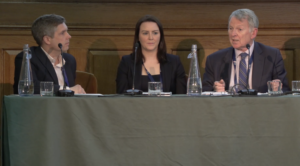
He highlighted that he was fascinated by the statistic that 32% of well-to-do customers of equity release have absolutely no concerns around it. However, the rise from 7% last year to 32% this year has been among the well-heeled clientele who have benefitted from the standards that have been put in place by the ERC over time.
“All the time standards evolve and change to the evolving market. As a result of the standards you have influential people like Martin Lewis or Hector Sanz stepping up to say that for some people the equity release market is all right and as long as you deal with someone from the ERC you should be ok if the circumstances are correct. However, here is the challenge. There is another cohort – the two and a quarter million more people that the FCA told us have been pushed into financial difficulties because of the pandemic, and that was even before the cost of living crisis hit,” he reflected.
He concluded on the note that, as Jeff pointed out, more and more people would be turning to equity release to supplement inadequate retirement incomes, and the challenge is that more of those people would be hailing from increasingly vulnerable backgrounds. Hence, the equity release market would need to continually adapt products, services and standards to cater for such people, he noted.
James finally asked Lyndsey Fallon, partner at Deloitte, to reflect on the concept of fair value. Lyndsey pointed out that a lot of time and investment has gone into consumer duty so far, and also into considerations needed around fair value assessment and the outputs of that. She emphasised that it has generated the right debate and discussion around interest, fees, charges and features needed to ensure that all customers are able to access the benefits from equity release, and in particular, cohorts such as vulnerable customers.
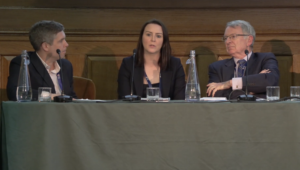
“One of key challenges for firms is the availability of data analysis to be able to demonstrate how different customers they interact with are able to access value from products such as equity release. That is going to become important moving forward as a need to show that you are offering fair value. As I reflect on a number of debates and discussions today there is a lot of talk on purpose and use cases (social care, green finance, retirement planning) but actually you really need to evidence you are reaching the right customers because that is where you will be able to demonstrate the most value from the products and services you offer,” she emphasised.
Secondly, she noted the challenge of defining the roles and responsibilities across equity release – funder, manufacturer and distributor – have regarding product design, price, fees and charges. She emphasised that consumer duty has helped shape that discussion and debate.
“If we look at what the FCA has started to say over the last week – if you have done your fair value assessment, how is that effective? This is going to move to focus on evidence and monitoring, to be able to demonstrate fair value,” she concluded.
Finally, a key audience question was posed on the issue of comparing equity release with other products such as mortgages based on the ability of customers to make monthly committed repayments vs flexible repayments as the only option in the equity release market being touted in the media.
Jeff Prestridge stated that it is all about education, and that most people in the press who consider themselves qualified to write about personal finance, understand that equity release is far more flexible than it was a decade ago, and that providers now allow customers to make part or even full monthly interest repayments. “There is an education exercise out there – people just assume with equity release that all the interest will roll up and that isn’t the case anymore. It’s a message that you need to get out as an industry and a message that people like myself and James need to beat the drum about. One of the great attributes of equity release 2023 is its far greater flexibility and consumer friendliness, so it is maybe simply a question of communication now.”
Jeff Prestridge concluded by emphasising the importance of trust and human interaction in building an equity release market that works for consumers.
“What counts is your relationship with your clients and building trust – you can’t do it on the telephone or the internet – it is all about face-to-face interaction and about coming around on an ad hoc basis to explain how the plan is progressing. That is a great advert for quality advice that we should allow to breathe in this country,” he noted.